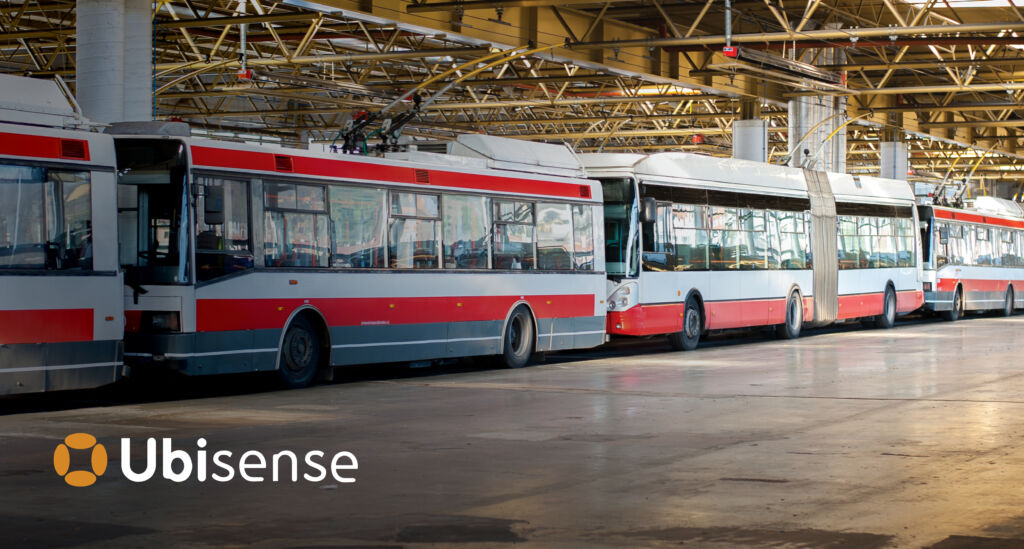Optimizing Fleet Management with SmartSpace: A Comprehensive Guide
Efficient fleet management is crucial for transit depots, where minimizing costs and maximizing productivity are top priorities. Ubisense’s SmartSpace Transit system offers a transformative solution that enhances fleet management through advanced technology and minimal infrastructure. This comprehensive guide explores how SmartSpace optimizes fleet operations, reduces costs, and improves overall efficiency.

Understanding SmartSpace Technology
SmartSpace by Ubisense integrates cutting-edge technology, including tags, sensors, and sophisticated software, to deliver real-time location intelligence. The system provides bay-level positioning, automated parking and dispatch, and a cloud-based platform that replaces traditional paper-based tracking methods. Let’s delve into how each component contributes to optimizing fleet management:
Tags and Sensors
SmartSpace utilizes ultra-wideband (UWB) and real-time kinematic (RTK) GPS technology to ensure precise vehicle location tracking. The tags, attached to vehicles, communicate with strategically placed sensors around the depot. These sensors capture data and relay it to the SmartSpace platform, enabling accurate, real-time tracking.
The SmartSpace Platform
The SmartSpace platform is the heart of the system, offering a user-friendly interface that provides comprehensive insights into fleet operations. Managers can monitor vehicle locations, track dispatch times, and manage parking efficiently. The platform’s cloud-based nature ensures that data is accessible from anywhere, facilitating seamless fleet management.
Benefits of SmartSpace Transit
Implementing SmartSpace Transit in a depot can lead to significant cost savings and operational improvements. Here are the key benefits:
- Enhanced Vehicle Locating
SmartSpace provides bay-level positioning, making it easy to locate vehicles within the depot. This precise tracking eliminates the time-consuming task of searching for vehicles, thereby reducing idle times and improving dispatch efficiency.
- Automated Parking and Dispatch
The automated parking and dispatch feature streamlines these processes, saving valuable time and resources. Vehicles are parked and dispatched based on real-time data, optimizing space utilization and ensuring timely departures.
- Digital Transformation
By replacing paper-based methods with a digital, cloud-based system, SmartSpace minimizes the risk of human error and enhances data accuracy. This transition to digital records improves overall operational efficiency and simplifies compliance reporting.
- Fuel Savings and Reduced Idling Time
One of the standout benefits of SmartSpace is the significant reduction in fuel consumption. On average, depots save 7,300 gallons of fuel annually due to decreased idling times. This not only lowers operational costs but also contributes to environmental sustainability.
- Time Savings
SmartSpace helps depots save an average of 15 hours per week in vehicle dispatching. The automated processes and real-time data availability ensure that dispatches are conducted swiftly and efficiently, allowing staff to focus on other critical tasks.
RTK GPS in Fleet Management
Real-Time Kinematic (RTK) GPS is a new technology for Ubisense and it offers high-precision location data essential for fleet management in large outdoor areas. This technology is crucial for managing large fleets within transit depots, where knowing the exact location of each vehicle at any time can significantly improve operational efficiency.
RTK-GPS works by using tags that communicate with a network of base stations to correct standard GPS signals, achieving near centimetre-level accuracy. This precise tracking capability allows SmartSpace to manage vehicles over large areas with minimal infrastructure, thanks to the long-range capabilities of the RTK GPS tags. The minimal infrastructure requirement makes the system cost-effective and easier to implement, ensuring that transit depots can quickly benefit from improved fleet management without excessive setup costs.
Case Study: TPF
TPF, a leading transit authority in Switzerland, implemented SmartSpace Transit to enhance their fleet management capabilities. The integration of SmartSpace allowed TPF to achieve remarkable improvements in operational efficiency. With bay-level positioning and automated dispatch, TPF significantly reduced vehicle idle times and streamlined their overall fleet operations. Currently, TPF operates a fleet of more than 250 vehicles.
Conclusion
Optimizing fleet management is essential for transit depots aiming to reduce costs and improve efficiency. SmartSpace Transit offers a comprehensive solution that leverages advanced technology to transform fleet management operations. From enhanced vehicle locating to automated dispatch and significant fuel savings, SmartSpace provides tangible benefits that make it a must-have for modern depots.
By implementing SmartSpace Transit, depots can achieve unparalleled efficiency, reduce operational costs, and contribute to environmental sustainability. The future of fleet management is here, and it’s powered by SmartSpace.
For more information about SmartSpace and how it can revolutionize your fleet management, visit Ubisense Transit Management.
